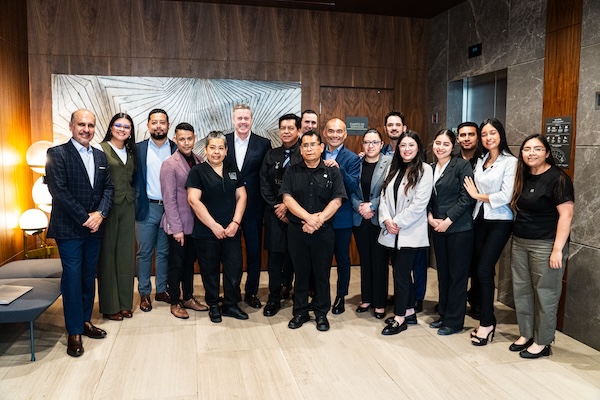Craig Smith doesn’t deal in antiquities, but to see his bookshelf, one might think he was a latter-day Indiana Jones—whip and fedora not included. There, in his home office, sit relics of the past: 1,000-year-old Inca figurines, an ornate Mexican Tree of Life and other religious tokens, including a prominent Ganesha, the revered Hindu deity, known as the remover of obstacles and the god of beginnings. The elephantine statue over his shoulder is an ideal emblem, a totem of support for Smith, who, as CEO of Aimbridge Hospitality, the largest third-party hotel operator in the world, is leading the company into a new dawn.
A raft of nettlesome issues hounded Aimbridge prior to Smith’s appointment as CEO in March 2024. In late 2021, a putative IPO was ostensibly scotched by capital market pressures, but the run up to it endorsed perception that Aimbridge was growing for the sake of growth, irksome to existing hotel owners who felt a level of detachment from the company—that it was more focused on the public markets than their markets. There was bloat organizationally, which impacted reporting and owner communication; problems over union contracts in California led to worker boycotts; the company also suffered from mounting debt load. A reputational fix was in the mix.
Enter Smith, who spent more than three decades with Marriott International and at his pinnacle presided over its international division. Now with Aimbridge, there is still no shaking his Marriott pedigree. He in turns invokes past and present Marriott luminaries—Bill Marriott, now executive chairman to the company that he grew into a global powerhouse; Arne Sorenson, the former CEO of Marriott International until his untimely death in 2021; and Simon Cooper, who led Ritz-Carlton for many years. All three are legendary hoteliers and shared one intrinsic trait, Smith said, one that he, too, imbues: presence.
“Bill Marriott’s happiest times are walking the kitchens. He wants to talk to the cooks, to the dishwashers. I knew I wanted to be that kind of leader,” Smith said. Of Sorenson: “We’d go to a hotel; we’d get in the car; he’d never pull out his phone.” Smith credited Cooper with helping shape his career in a LinkedIn post shortly after Cooper’s death in 2024. “He would push us so hard, but also walked around and teased with everybody,” Smith said. “It’s the idea of a leader being present.”
With around 1,000 hotels globally, Smith has done a lot of walking and visiting properties in the time since his appointment as Aimbridge CEO. Like Bill Marriott, he sometimes gets the rock-star treatment. “A couple of people wanted a picture with me. And I’m like, ‘I’m not one of the Kardashians. I’m just Craig.’ But I get to meet people, ask questions, find out what’s really going on in the company.”

Truth Told
According to Smith, Aimbridge suffered from a fractured culture, operational hitches and a capital structure that impinged growth. Smith quickly identified the ills of the company and took immediate remedial measures. One was to change its sprawling structure into a flatter, nimbler company with less inter-organizational complexity. Smith referred to it as removing layers. “One of the things I found is what I call reverse delegation,” he said, basically when managers take back previously delegated assignments. “It was almost like we’re asking the hotel team to do more. We should be taking things off their plate so that they’re focused on what’s most important for them—and that’s focusing on the customer and driving results.”
There was also a churn problem. “Our turnover of GMs, above-property leaders, corporate staff was big,” Smith said. “We’ve cut that way down.”
He’s filled out his bench with Marriott alumni, such as Eric Jacobs, chief global growth officer, someone who shares Smith’s vision of quality over quantity and longer-term investments and partnerships. Other former Marriott include Cindy Choi, chief strategy officer, and Chris Tatum, president of Aimbridge’s full- service division.
Aimbridge has its Dallas headquarters, but Smith wants to shift from a corporate-centric culture to a concentration on the operations of its portfolio of hotels. “I wanted the spotlight to turn around and everything to be about the hotels,” he said. “We forgot that we’re a hotel company and we forgot that the most important job is the general manager of the hotel, not the folks at corporate headquarters.” Furthermore, he’s made it clear that corporate Aimbridge exists to service Aimbridge’s properties, because they, ultimately, service the guest. “If that phone rings and it’s one of our hotels, you had better answer because you’re serving them and they’re serving the guest,” Smith said.
Enacting and inspiring a performance culture was a primary action of Smith’s. Like some of his hires, Smith is a long supporter of balanced scorecard, a framework for evaluating a hotel’s performance that goes beyond its financial achievements to also consider the property’s success in satisfying customers, operating effectively and innovating. It’s a management tool long used at Marriott-managed hotels. “We didn’t have goals in place and those goals didn’t roll up and down the organization,” Smith said.
Beyond cultural and organizational fixes, a major, company-defining pivot by Aimbridge is how it functions as the largest third-party operator in the world. In previous years, Aimbridge could leverage its size to undercut competitors and win management contracts with terms better set for owners. One encounter Smith had on a shuttle bus with other operators illustrated it. Those aboard expressed chagrin, telling Smith, “We walk away if we know you’re bidding because you’ll bid lower than anyone else.” It was a defining moment for Smith.
Aimbridge used to incentivize owners on annual contract value, which is the total value of a customer’s contract on a per-year basis. But with a shorter contract, you might not even get to a third stabilized year, Smith explained. He now prioritizes longer contracts. “Now, we’re hearing people say, ‘Gosh, Aimbridge is walking away from deals.’”

Getting Right
The cultural and organizational shifts were succor; Aimbridge’s heaviest burden was its capital structure. In January 2025, Aimbridge rightsized it through a restructuring agreement that converted more than $1.1 billion in debt to equity, infused it with $100 million in new capital and made the first-lien lenders majority owners, taking over from Advent International, the majority owner since 2019.
Smith is introspective and reflective about his one-plus year at the helm of Aimbridge and the thorny issues he tackled. He acknowledges a stressful last year, but one that had to be confronted head on to right the ship. “It was a massive swing,” he said of the debt restructuring.
Smith, neatly coiffed, relaxed, smiling in his San Diego home, is much less fretful today. Worries past allow him to concentrate on the business at hand: running profitable hotels, which has been a legacy calling card for Smith. Operations is Smith’s specialty—and he knows it. He doesn’t attempt to color outside the lines. “I worked in development and it’s not my forte,” he said, heaping praise instead on his lieutenant Jacobs, whom he called “a great developer.”
Smith found his sweet spot at an early age, working for his uncle’s hotels in Provo, Utah. That’s where he fell in love with the business. It’s also where he got some well-timed, avuncular advice. “He said, ‘Build out a career plan; tell your boss where you want to be in the future.’” At Smith’s first role with Marriott, he told his boss he one day wanted to be a regional vice president. He shot too low, it turned out. “I knew that whatever got me to the next role wasn’t going to get me to the role after that. I didn’t want to stop learning,” he said.

Forward Ho
The directive for Aimbridge is clear: continuity and precision growth. Though third-party management companies thrive off strong deal flow—modest right now—Aimbridge is in a position to benefit as Europe becomes more comfortable with the franchise model. (In 2019, Aimbridge merged with Interstate Hotels & Resorts, which gave it credibility and a footprint in the region.) It already has a strong presence on the continent with more than 70 hotels, and that could grow. Europe, Smith said, is setting out on the same franchise journey today that the U.S. did some two decades ago, prompting more conversations between Aimbridge and international hotel companies, particularly now as Smith further rights the ship. In one instance, a CEO told him to hurry up and get Aimbridge to where it needed to be. “We need you overseas,” the CEO said. Smith has had extensive conversations with Accor, for instance. “Our opportunity overseas is phenomenal,” he said.
Still—and despite the allure—Smith practices restraint. One of his favorite words is discipline. “If I try to grow everywhere internationally, I’ll fail,” he said. “You kind of look back and say, ‘OK, was one of the mistakes growing too quickly?’” Maybe. Nonetheless, Smith has a different mantra nowadays: fees over keys.
A true test of a leader is owning up to faults. But Smith is done with the apology tour, turning the corner and driving forward. For a company as large as Aimbridge, it makes sense that it would have separate divisions. Up to now, those included full service, select service, lifestyle (through Evolution Hospitality, which Aimbridge acquired in 2015), EMEA and LATAM. Keeping watch of trends, Aimbridge recently launched an all-inclusive division to tap into a segment of the industry that is growing in popularity with customers and brands, alike.

Despite reemerging under a new capital structure, Smith said that its new owners are not shy to invest in technology. Aimbridge is already deploying artificial intelligence in its revenue management. “[Our owners] are telling us that technology should be a huge competitive differentiator going forward,” he said.
Aimbridge is a global operator. Craig Smith is an international man. Maybe not of mystery, but his hobbies, including motorcycling, skiing, scuba diving and piloting, and favorite movie characters—James Bond and Ethan Hunt— sure give him a mystique. Add that he’s a polyglot who has lived in Hungary and Thailand, among other places, and one gets the sense that Smith was the ideal choice to lead Aimbridge forward.
Not surprising is Smith’s favorite author, Peter Drucker, who contributed to the foundation of modern management theory. He reads Drucker’s “The Effective Executive” once a year, an instruction of how individuals can become more effective in their roles, emphasizing the importance of getting the right things done rather than simply being efficient. It’s a book that not only helps guide Smith’s decision-making; he uses it to cultivate and develop those around him. “We don’t own the building,” Smith said. “What we do own is the talent. And that’s the number one thing.”

